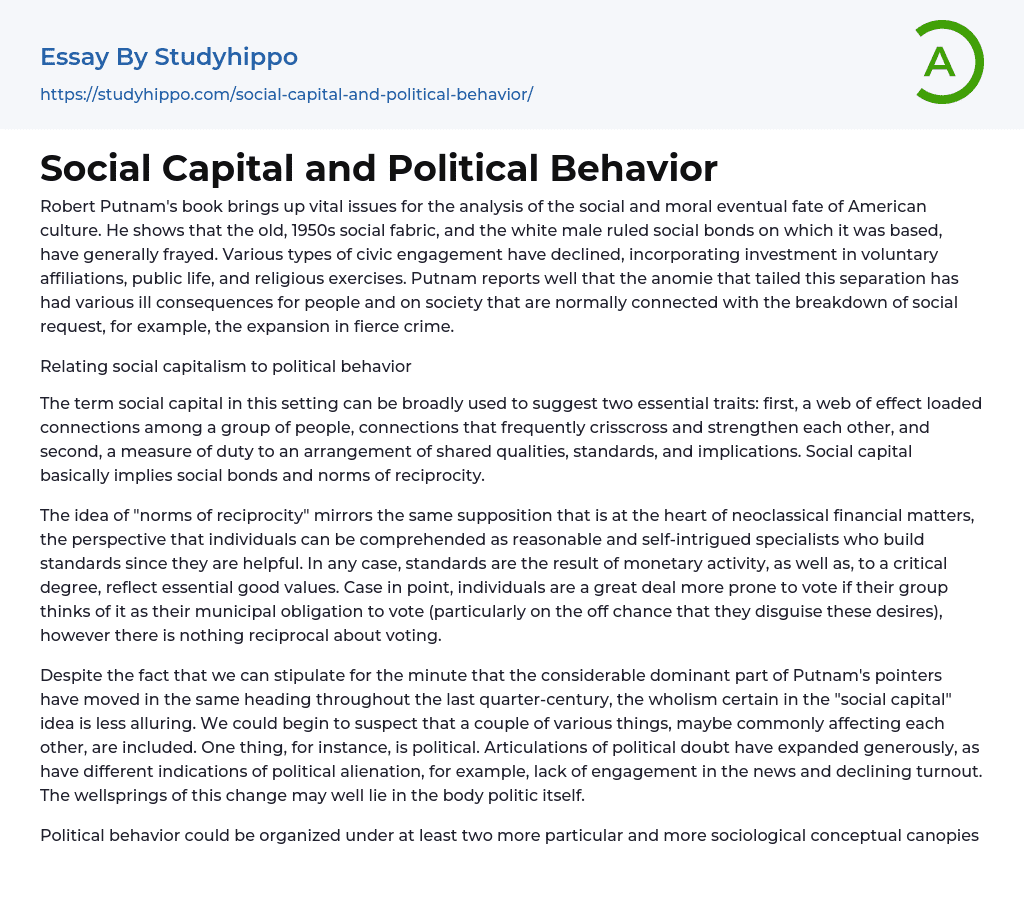Robert Putnam's book brings up vital issues for the analysis of the social and moral eventual fate of American culture. He shows that the old, 1950s social fabric, and the white male ruled social bonds on which it was based, have generally frayed. Various types of civic engagement have declined, incorporating investment in voluntary affiliations, public life, and religious exercises. Putnam reports well that the anomie that tailed this separation has had various ill consequences for people and on society that are normally connected with the breakdown of social request, for example, the expansion in fierce crime.
Relating social capitalism to political behavior
The term social capital in this setting can be broadly used to suggest two essential traits: first, a web of effect loaded connections among a group of people, connections that frequently crisscross and strengthen each oth
...er, and second, a measure of duty to an arrangement of shared qualities, standards, and implications. Social capital basically implies social bonds and norms of reciprocity.
The idea of "norms of reciprocity" mirrors the same supposition that is at the heart of neoclassical financial matters, the perspective that individuals can be comprehended as reasonable and self-intrigued specialists who build standards since they are helpful. In any case, standards are the result of monetary activity, as well as, to a critical degree, reflect essential good values. Case in point, individuals are a great deal more prone to vote if their group thinks of it as their municipal obligation to vote (particularly on the off chance that they disguise these desires), however there is nothing reciprocal about voting.
Despite the fact that we can stipulate for the minute that the considerable dominant part
of Putnam's pointers have moved in the same heading throughout the last quarter-century, the wholism certain in the "social capital" idea is less alluring. We could begin to suspect that a couple of various things, maybe commonly affecting each other, are included. One thing, for instance, is political. Articulations of political doubt have expanded generously, as have different indications of political alienation, for example, lack of engagement in the news and declining turnout. The wellsprings of this change may well lie in the body politic itself.
Political behavior could be organized under at least two more particular and more sociological conceptual canopies. One is the recognizable construct of individualism. It is astounding that Putnam does not recognize that quite a bit of his topic is the thing that the vast majority call "individualism."
Americans giving less cash to philanthropy, being less friendly, or being more materialistic. A few points in Bowling Alone will be preferable named individualism rather over "social capital" if impartiality is categorized as communal practices that support singular interests over group interests.
The second political behavior is privatism. Regardless of the possibility that it is stipulated, for examination, that Americans have pulled back from open exercises, for example, governmental issues and municipal clubs, the inquiry emerges concerning whether they have pulled back the distance into their isolated, lonely selves (extreme independence), or have pulled back into a more private universe of family, work, and companions an account of more prominent, yet at the same time social privatism. Either this public versus private plan or the independence detailing better catches the regular issues in the blend of practices Putnam marks "social capital." Moreover, the authentic patterns
concerning these different domain legislative issues, associations, independence, and privatism might be only apparently coincident.
Reference
- Putnam, R. D. (2001). Bowling alone: The collapse and revival of American community. Simon and Schuster.
- Acceptance essays
- Age Of Enlightenment essays
- Child Observation essays
- Confucianism essays
- Conscience essays
- Critical Reflection essays
- Destiny essays
- Determinism essays
- Empiricism essays
- Environmentalism essays
- Epistemology essays
- Ethics essays
- Ethos essays
- Existence essays
- Existentialism essays
- Fate essays
- Free Will essays
- Functionalism essays
- Future essays
- Good And Evil essays
- Human Nature essays
- Individualism essays
- Meaning Of Life essays
- Metaphysics essays
- Natural Law essays
- Personal Philosophy essays
- Philosophers essays
- Philosophy Of Life essays
- Political Philosophy essays
- Pragmatism essays
- Reality essays
- Relativism essays
- Teaching Philosophy essays
- Time essays
- Transcendentalism essays
- Truth essays
- Utilitarianism essays
- Addiction essays
- Anatomy and Physiology essays
- Biodegradation essays
- Cancer essays
- Dental Care essays
- Disability essays
- Disease essays
- Disorders essays
- Health Care essays
- Infectious Disease essays
- Inquiry essays
- Intelligence Quotient essays
- Lung Cancer essays




